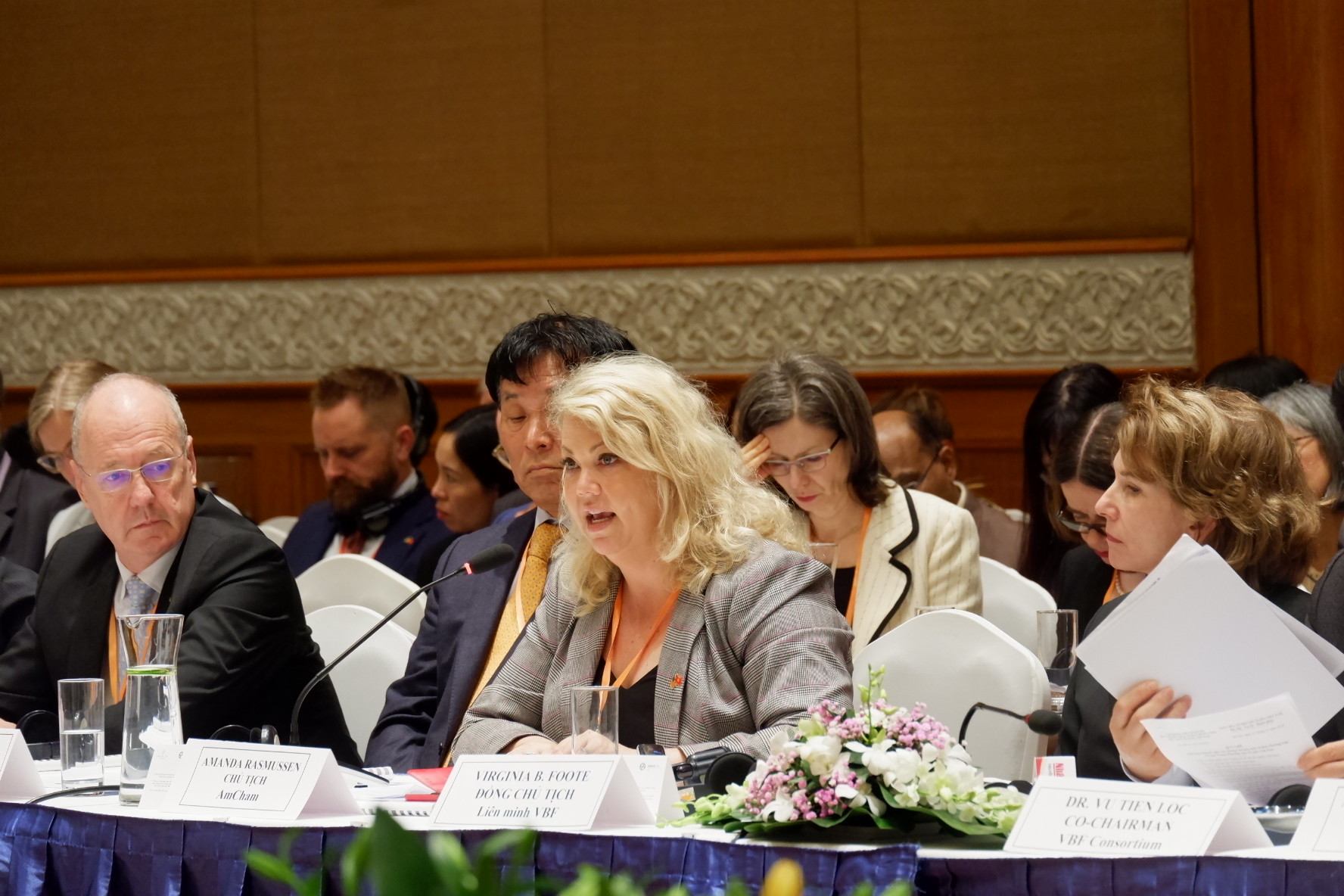American companies have interest in Vietnam’s continued success: AmCham
Promoting a fair, transparent, predictable, and streamlined regulatory ecosystem that values innovation will help Vietnam continue to attract high-quality investment.
As major investors in Vietnam, American companies have an interest in the country’s continued success, said Chairwoman Amanda Rasmussen of AmCham Vietnam, affirming AmCham’s commitment to work with the Vietnamese government to help improve business conditions and ensure sustainable economic and social development.
AmCham members together represent billions of dollars in foreign investment, tens of thousands of direct employees, hundreds of thousands of indirect employees, and a significant share of Vietnam’s exports and tax revenues, Rasmussen said at the annual Vietnam Business Forum (VBF) on January 10.
| Amanda Rasmussen speaks at the annual Vietnam Business Forum (VBF) on January 10. Photo: Minh Tuan |
“We are committed to partnering with Vietnamese authorities to develop the regulatory ecosystem, physical infrastructure, and talent to promote sustainable economic growth and innovation, and to ensure that Vietnam is a leader in the digital economy and Industrial Revolution 4.0,”she noted.
AmCham members have brought high-quality products and state-of-the-art technologies, services, and business practices to Vietnam. They have partnered with Vietnam to develop high-tech, innovative industries. “We are committed to upholding Vietnam’s labor and environment laws, and to being good corporate citizens. Our companies are leaders in promoting sustainability and innovation in Vietnam through global business practices that ensure responsible supply chains and combat climate change.”
“We want to partner to develop infrastructure that ensures energy security and facilitates sustainable growth. We share an interest in developing a globally competitive workforce, creating quality jobs, and investing in the professional development of our Vietnamese team members. We will help find solutions to emerging concerns - such as air quality - in order to ensure a healthier, safer, cleaner and greener Vietnam,” Rasmussen added.
She also noted that Vietnam continues to be one of the fastest growing export markets for the US and the US remains the largest export market for Vietnam. With a growing trade imbalance, AmCham members need to encounter a level playing field in Vietnam and want barriers to trade and investment are eliminated.
Promoting a fair, transparent, predictable, and streamlined regulatory ecosystem that values innovation will help Vietnam continue to attract, retain and grow high-quality trade and investment, including by AmCham member companies.
In this regard, AmCham suggests the Vietnamese government pay attention to fair and predictable tax policies, customs modernization, elimination of technical barriers to trade, and transparent and timely land use permitting.
Rasmussen stressed the need of realizing the full potential of the digital economy. “Consider Vietnam’s large, youthful population ready for new technologies; the high number of Internet users and smartphone apps usage - in both urban and rural areas; and the increase in software production and technology manufacturing. Vietnam and its people are poised to embrace the fourth industrial revolution (Industry 4.0).”
The digital economy is a major component of the digital revolution happening in Vietnam. Maintaining a free and open digital economy is key to maintaining Vietnam’s competitiveness and promoting innovation. The digital economy significantly reduces costs, provides products and services to a broader range of consumers, and increases access to newer and bigger markets, she said.
Once again, AmCham raised the issue of cybersecurity. Requirements under current law for data localization and local offices impose unnecessary burdens to service providers without corresponding benefits. AmCham seeks implementing guidance to reduce confusion and ease uncertainty, she said, referring to the Law on Cybersecurity that entered into force in January 2019.
Rasmussen tipped that AmCham members are eager to partner with Vietnam to develop infrastructure that integrates the country and promotes inclusive, sustainable growth as
infrastructure is one of the key constraints limiting Vietnam’s economic growth.
AmCham suggested the government establish a Public Private Partnership (PPP) that enables private investment in infrastructure projects. Sustainable growth in Vietnam depends on investments in port infrastructure, airport facilities, roads, and public transportation to support increased movement of people and goods in Vietnam.












